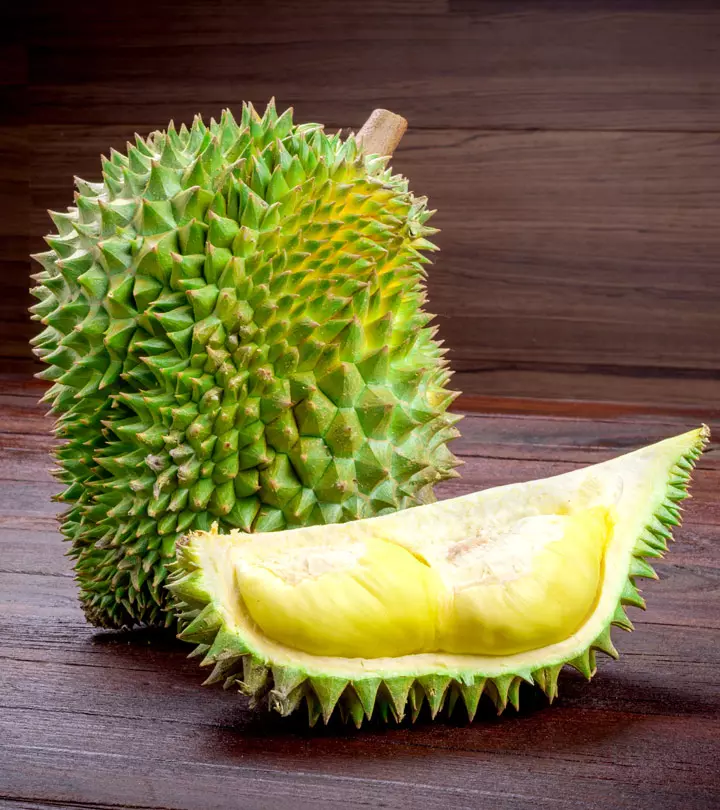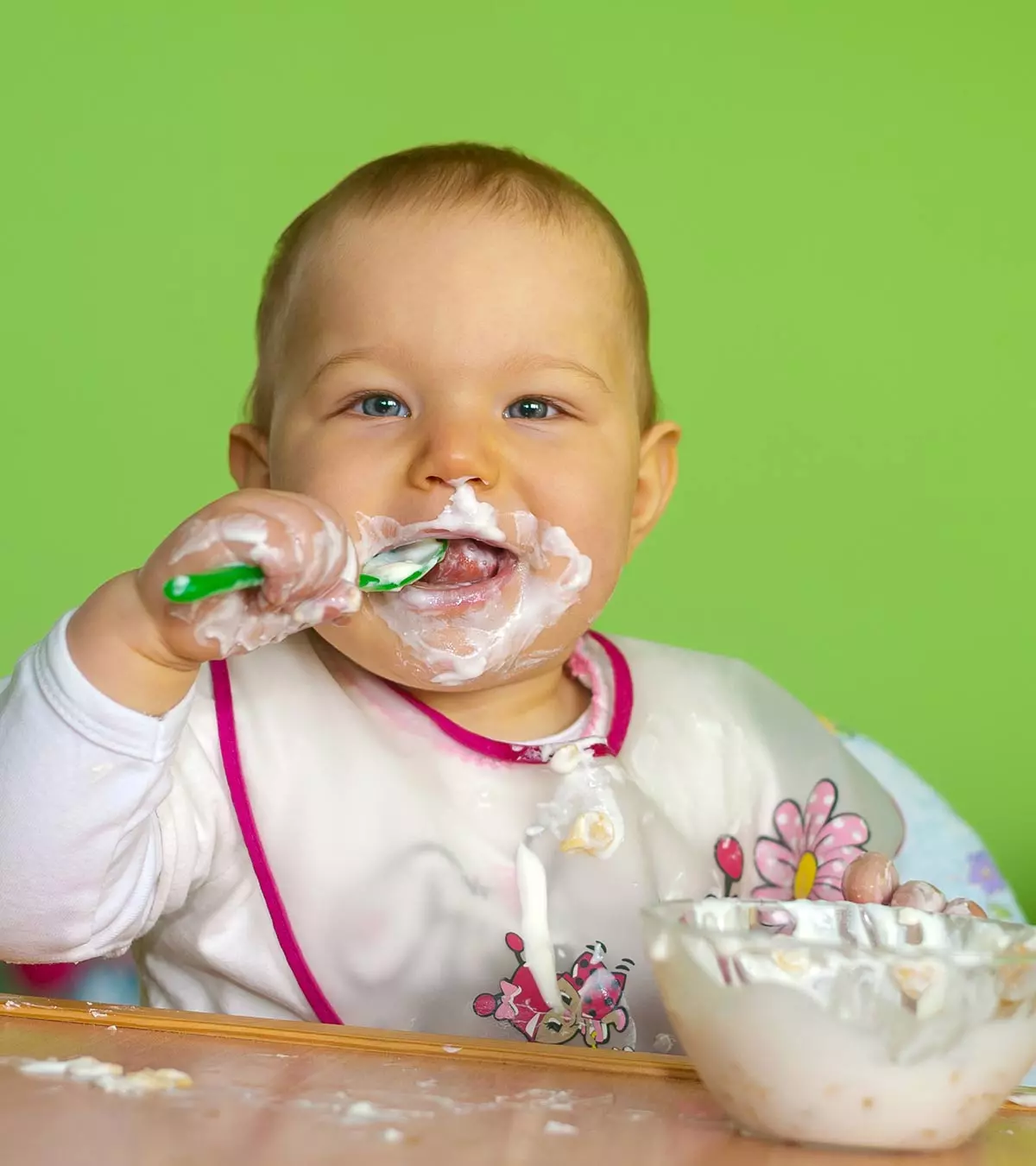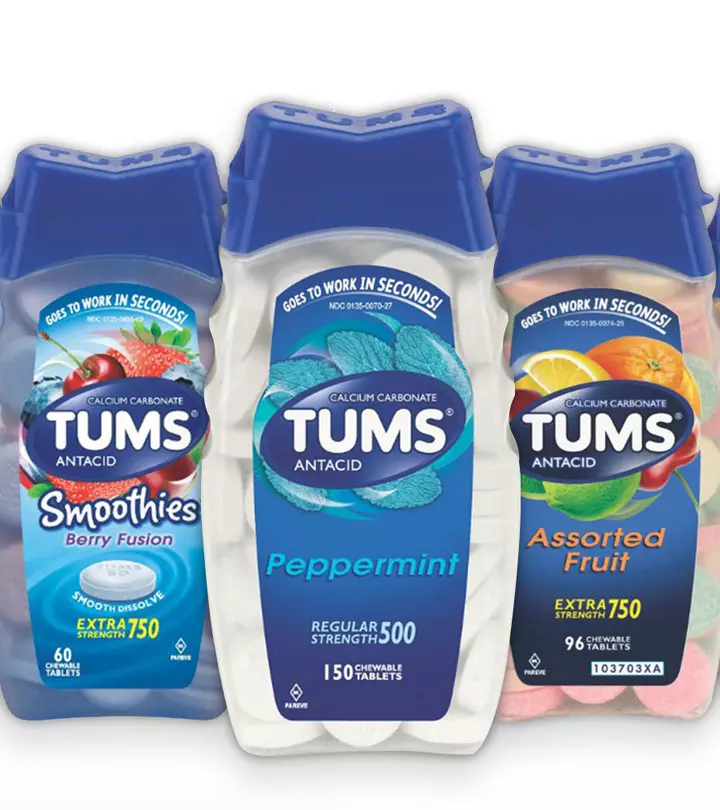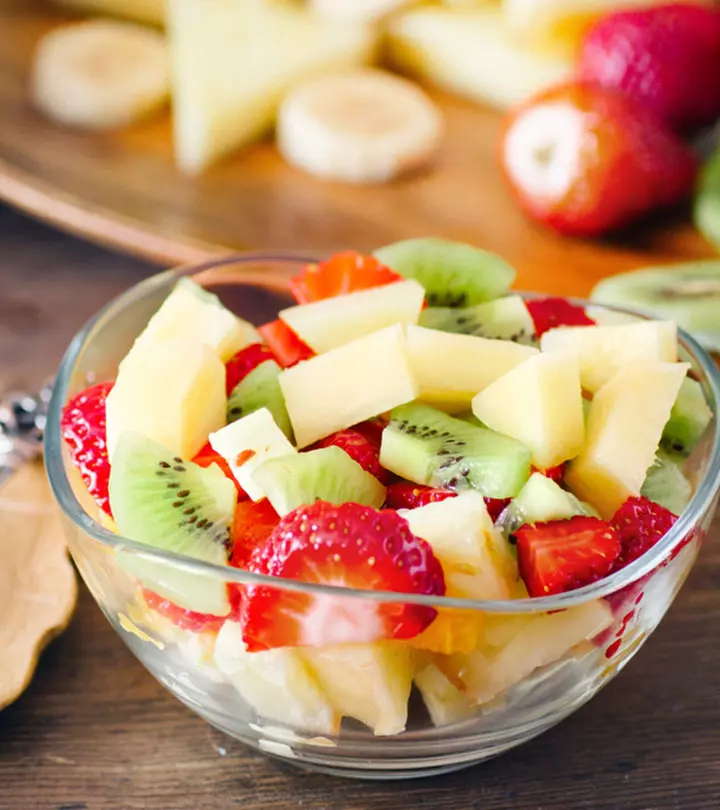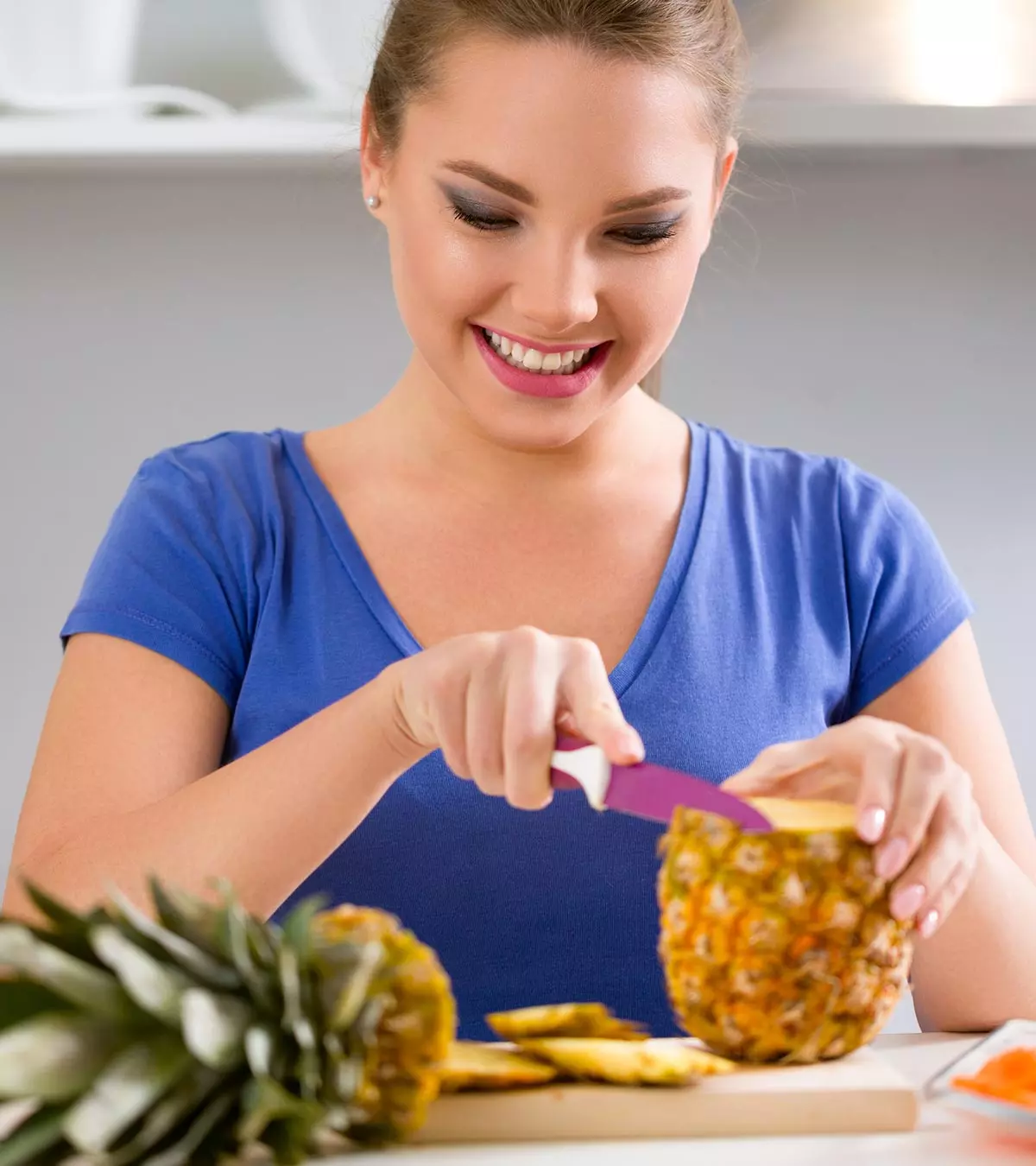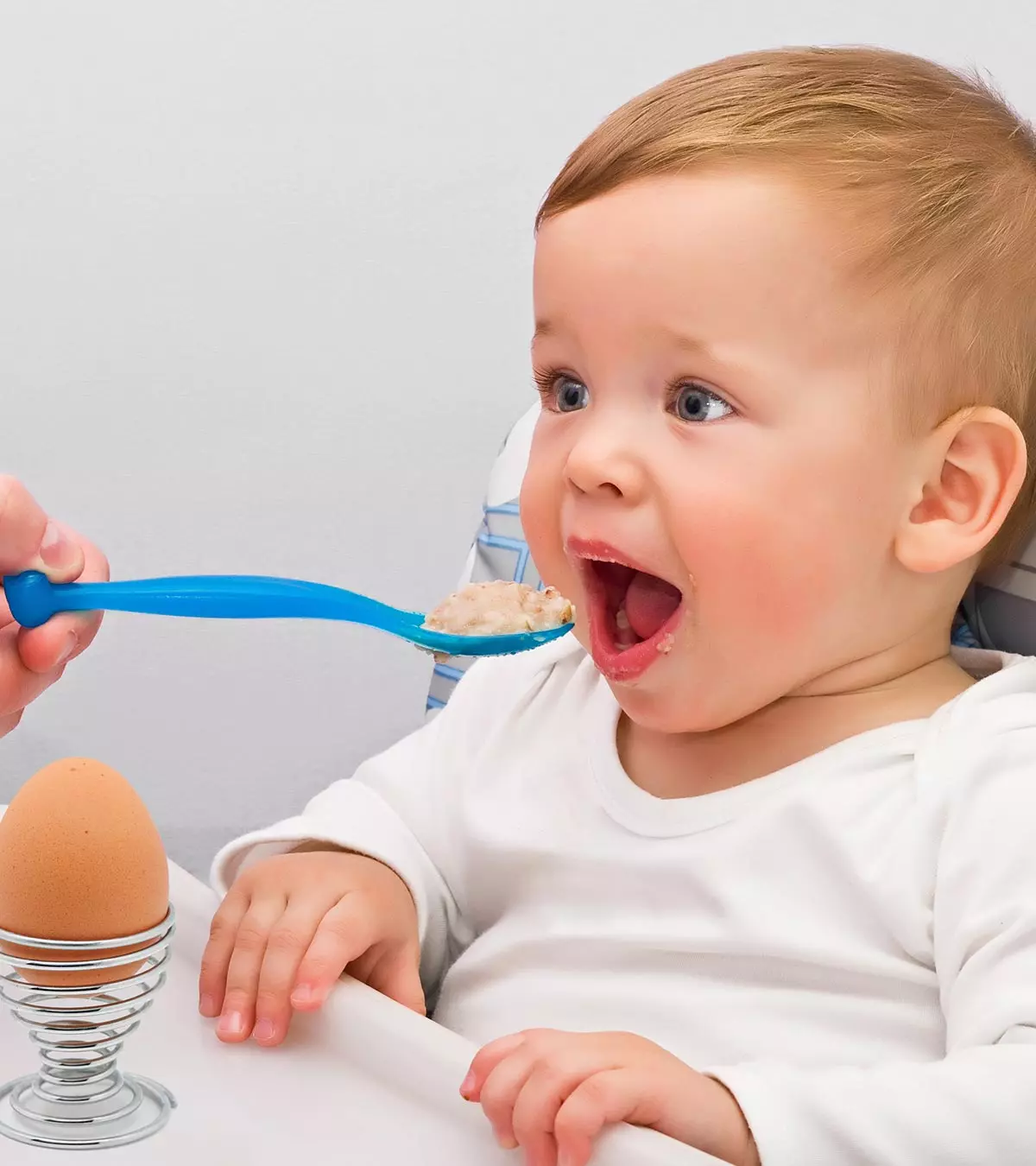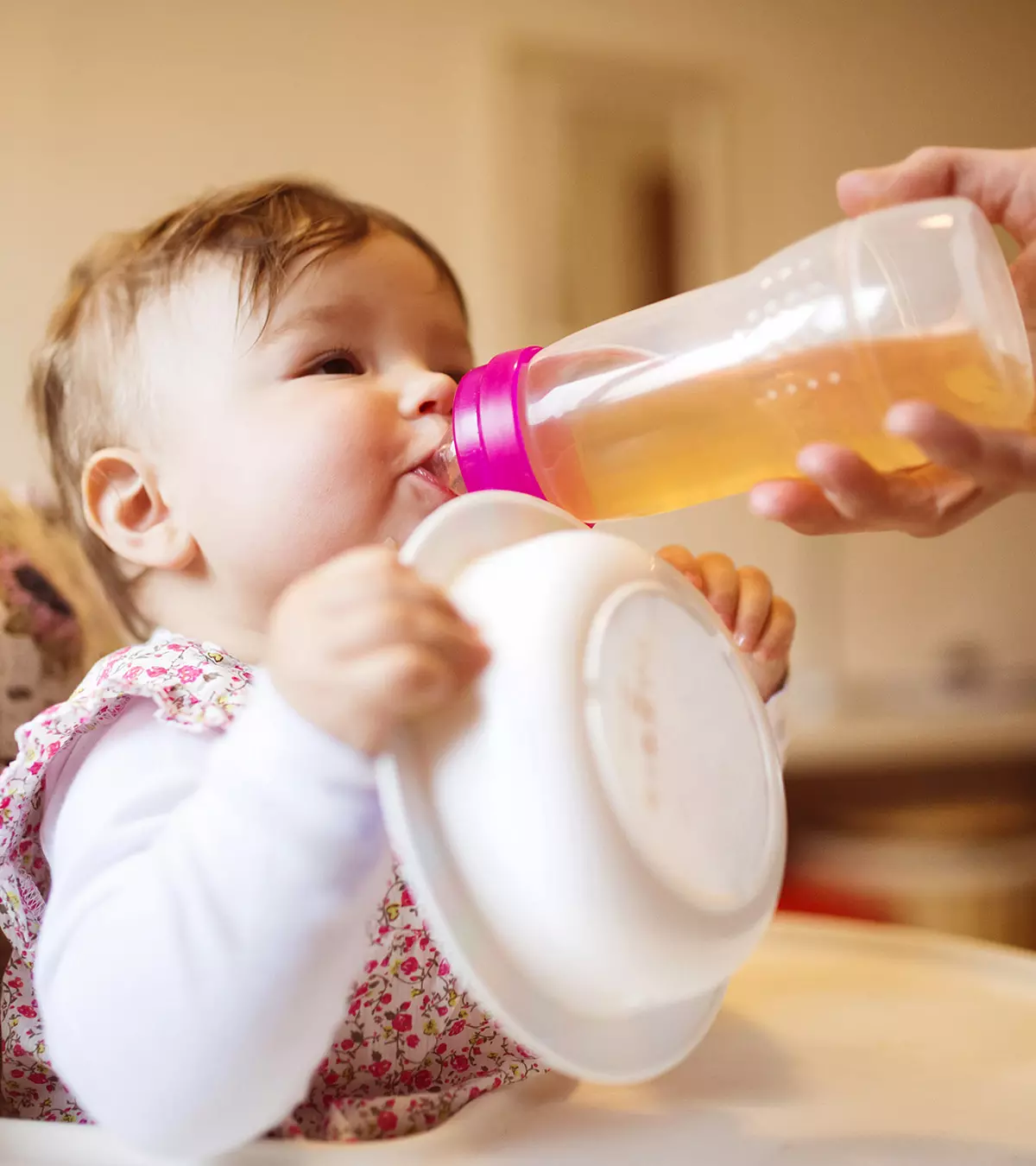
Image: ShutterStock
Drinking a warm cup of chamomile tea can be soothing and help you sleep or relax. But can chamomile tea for babies work the same way? Though it has relaxing and soothing properties, you may want to know in detail before you give it to your little one. Infusing this popular home remedy in your baby’s cup could help control coliciProlonged crying or fussiness in a baby. and ease fussiness, but does it have other benefits? Keep reading this post as we tell you how safe chamomile tea is for babies, its side effects, and more.

Key Pointers
- Chamomile is often used to make tea and has a calming effect.
- It can be given to babies over six months old after consulting a pediatrician.
- Chamomile has beneficial properties such as promoting sleep and improving digestive issues like colic.
- Pure, branded, and properly wrapped tea bags are preferred picks for babies.
- It’s essential to limit the amount of chamomile consumed to avoid adverse side effects like allergies, nausea, and cross-reactivities.
What Is Chamomile Tea?
Chamomile tea is an herbal infusion made with dry chamomile flowers and hot water (1). The chamomile plant is commonly found in Europe and comes in two varieties: German chamomile and Roman chamomile (2).
The US Food and Drug Administration has categorized chamomile as “generally recognized as safe” (GRAS) for use in food. Although there is no data available on the safety of chamomile in nursing mothers or infants, it is safely used for infants. However, there might be a rare risk of sensitization (3). Therefore, you need to talk to your pediatrician before using chamomile tea for your baby.
When Can Babies Have Chamomile Tea?

Chamomile tea could be given to babies aged six months or older (4).
It is considered safe after the baby is a year old—this is also when you can also introduce other foods and the chance of food allergies in babies is less (5). Babies under the age of six months should have only breast milk.
In any case, do NOT introduce chamomile tea without consulting your pediatrician or a pediatric dietitian. If you get the go-ahead, you may introduce it in small amounts.
How Much Chamomile Tea Can A Baby Have?
For the first dose, you could stick to 0.5oz (15ml). If the baby accepts it well, then you can start giving 1oz (30ml) of tea per dose whenever the baby has colic, fussiness, gastric discomfort, and other conditions that are considered to be relieved by chamomile tea.
A study has found that about 5oz (147ml) of herbal tea per dose displayed the maximum benefit to the baby (6).
However, it is best to choose a smaller quantity. About 2-3oz (60-90ml) of chamomile tea per day (24 hours) is considered safe to use and could be beneficial too.
In any case, your baby’s doctor could suggest the ideal dosage of this tea for the baby.
Benefits Of Chamomile Tea For Babies
Chamomile tea could provide the following benefits to a baby.
1. Could subdue colic and fussiness

Studies have found that chamomile tea may help soothe colic in infants, thereby promoting a restful sleep. However, clinical trials supporting this claim are limited (4). In some studies, regular use of tea has shown to control chronic colic. It was also found that babies who tend to be fussy also felt better after the consumption of chamomile tea.
2. Could aid sleep
Chamomile extract has been used as a sleep aid in traditional medicine to alleviate sleep problems. Both oral and topical application of chamomile has shown to have calming effects that help induce sleep (1). Thus, its use may prove to be useful in cases where the infant has a disturbed sleep schedule. However, there are limited clinical studies to support the proposed benefit.
Some mothers also consume chamomile tea when breastfeeding, and it is believed to have an indirect effect on the baby. A mother of a four-month-old boy and a blogger says chamomile tea may have soothed her sleep-regressive baby. She claims, “I started drinking chamomile tea. Not only am I calmer, but baby A (her baby) seems calmer. He slept the longest stretch he’s ever slept in months (i)!”
3. May work as a digestive relaxant
Traditionally, chamomile tea has been used as a herbal remedy to treat digestive problems in babies. It is believed that chamomile has several bioactive compoundsiExtranutritional constituents that occur in small amounts in foods. that could help relax the digestive tract, thus aiding in digestion (1). Chamomile tea may provide relief from stomach cramps as well (7).
 Quick fact
Quick fact4. May aid relieve common cold symptoms
Chamomile tea is considered to relieve upper respiratory discomfort caused due to common cold and cough. Giving your baby some chamomile tea during cold could help in making breathing easier. It might also help in stimulating the immune system to fight off the viral infection (9).
 Quick fact
Quick fact5. Has anti-inflammatory properties
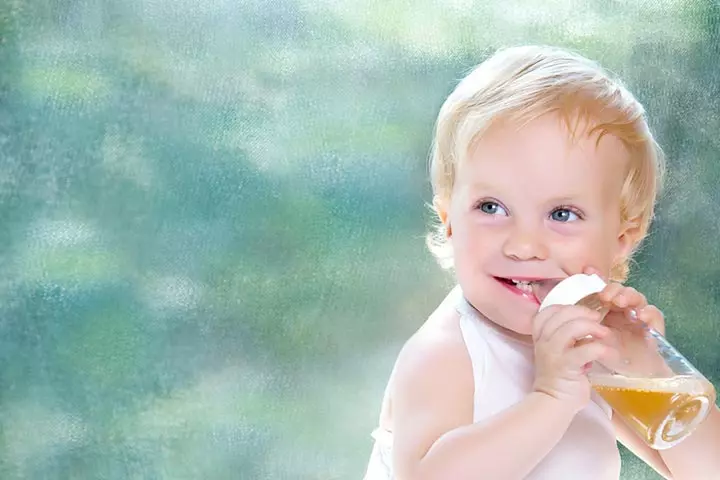
Chamomile has been found to have antioxidant properties (8). This property could be useful when the baby suffers from an inflammatory skin condition such as a sunburn or diaper rashiA skin condition in babies caused by the frequent use of diapers and their contact with feces and urine. . It is owing to the same property that chamomile tea is also believed to be helpful in reducing inflammation and irritation of the gums during teething (9).
6. May ease some medical conditions
As per folklore and traditional medicine practices, chamomile tea is believed to reduce the intensity of some gastrointestinal tract conditions such as irritable bowel syndromeiA common problem characterized by stomach cramps, constipation, diarrhea, and bloating. (IBS) and gastroesophageal refluxiDigestive disease occurring due to stomach acid flowing back to the esophagus. (GER). However, clinical studies supporting the belief are limited.
While some parents may report positive experiences, scientific evidence supporting these benefits is limited. It’s important to consider your baby’s specific health needs and consult a pediatrician before offering chamomile tea.
Also, if you are using chamomile for the baby, you need to be careful while buying it.
How To Purchase Chamomile Tea For Babies?
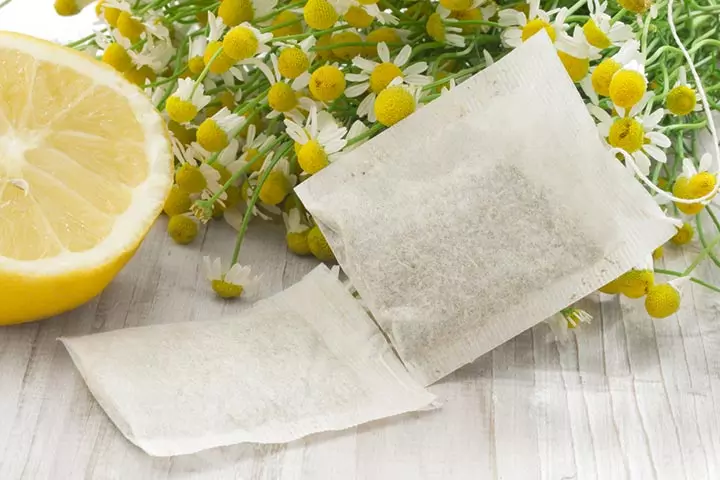
Here is how you can pick the best chamomile tea for your baby:
- Reputed brand and store: Always buy tea manufactured by a trustworthy, popular brand. It ensures that you get pure chamomile tea, without any adulteration and contamination. Also, purchase it from a reputed store to make sure the tea is not tampered with.
- Choose only tea bags: Tea bags are factory-made and often come sealed in individual packets. It makes them less prone to bacterial contamination, even when the main packaging is opened.
- Never purchase loose chamomile tea: A study found that unwrapped/loose chamomile tea sold in herbal stores is often contaminated with the spores of the Clostridium botulinum bacteria that can cause infant botulism, which is the colonization of bacteria in the intestine (6).
Babies below the age of 12 months are susceptible to botulism since their natural intestinal bacterial floral cannot overpower the Clostridium bacteria (10). After the first year, the baby’s intestines have enough good bacteria to fight harmful bacteria. Nevertheless, avoid using loose chamomile tea for babies.
- Select pure chamomile tea: Ensure that you buy only pure chamomile tea bags, without added ingredients such as peppermint, tea leaves, rooibos leaves or lavender, as you do not know how the baby’s body would react to them.
Once you buy the tea from the right source, you need to prepare it right. Let’s see how to do it.
How To Prepare Chamomile Tea For Babies?
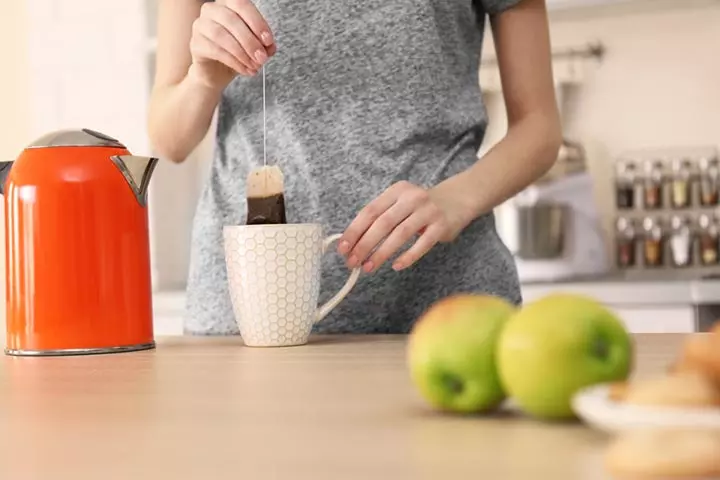
Follow these steps to make chamomile tea for babies:
- Boil water.
- Place the tea bag in a cup and add boiling water to it.
- Let it stay for 10 minutes.
- Remove the teabag and let the water become lukewarm.
- Give the tea in small sips or with a spoon to the baby. You can also use a feeding bottle or a sipper.
Remember not to add honey or milk to tea when preparing it for babies.
Are There Any Side-Effects Of Chamomile Tea For Infants?
Yes, like any other food item, chamomile tea could have side-effects. The following are the possible side-effects in babies:
1. Food allergy
A baby can be allergic to chamomile tea. Symptoms include skin hives,iSplotches on the skin caused by allergens, physical triggers, or by an underlying medical condition. nausea, vomiting, swelling of the face, and immense lethargy. Severe allergy causes a condition called anaphylactic shockiA severe allergic reaction with symptoms such as breathlessness and swollen throat. , where the symptoms multiply (11). Take your baby to a doctor if you suspect an allergic reaction to chamomile tea.
Chamomile might also have the possibility of cross-reactivity with echinaceaiGroup of flowering plants used as herbal medicines. , feverfewiA herbal plant used for relieving migraine, pain, headache, vomiting, and light sensitivity. , milk thistleiA medicinal plant of the Asteraceae family used in the treatment of liver disease, mushroom poisoning, and even cancer. , and other members of the aster family. So, if your baby is allergic to any one of these, then the chances of allergy to chamomile are higher, too.
2. Reaction to medicines
Chamomile may react with some drugs, including antifungal drugs. So if your baby is on some medication, then double-check with the doctor before giving chamomile tea to the baby (12).
3. Reaction to other food items
Chamomile may react with other food items consumed by the infant. It can react with other plants within the same botanical family as chamomile, such as the sunflower (13). So be extra careful when you want to give chamomile to the baby.
4. May complicate some medical conditions
If your baby suffers from some congenital problems, then chamomile may complicate the disease. For example, if your baby has congenital type-1 diabetes, then chamomile may cause a drastic dip in blood sugar, causing hypoglycemia, which can be harmful to the baby.
Check with the pediatrician before giving chamomile tea to your baby, especially if the baby is on medication or has a congenital health issue.
Frequently Asked Questions
1. Is chamomile a common allergen?
No, chamomile isn’t a common allergen. However, it can cause allergic reactions in sensitive individuals. A baby is more likely to be allergic to chamomile if they are allergic to related plants such as marigold, daisy, ragweed, and chrysanthemum (15).
2. Can I bathe my baby in chamomile tea?
Chamomile tea is sometimes consumed as a tisane and is also used to prepare tea-infused baths for relaxation and rejuvenation, for its soothing properties (16). However, the safety and efficacy of these tea-infused baths for babies is unclear. Thus, speak to your doctor before trying chamomile tea for your baby.
3. Is chamomile tea the same as gripe water?
No, chamomile tea and gripe water are different. Chamomile tea is a herbal infusion crafted from chamomile flowers, commonly enjoyed for its soothing qualities. Gripe water, on the other hand, is a liquid supplement used to alleviate colic and digestive discomfort in infants (17).
5. Is chamomile tea a good alternative to breastmilk or formula for babies?
No, chamomile tea is not a suitable substitute for breast milk or formula for babies. Babies need the vital nutrients and antibodies present in breast milk or appropriately designed infant formula to ensure their optimal growth and development.
6. Are there any nutritional benefits to chamomile tea for babies, or is it primarily used for its medicinal properties?
Chamomile tea is mainly used to soothe and calm babies, promoting digestion and sleep (1). Although it offers mild nutritional advantages, it isn’t a major nutrient source for infants. It’s crucial to consult a pediatrician before introducing chamomile tea into a baby’s diet.
7. Can chamomile tea be mixed with other herbal tea or natural remedies for added benefits, or is it best to use it alone?
Chamomile tea can be blended with herbs such as German chamomile, vervain, licorice, fennel, and balm mint to enhance its advantages. Clinical trials demonstrate that combining chamomile tea with other herbs or natural remedies effectively treats conditions like infant colic and alleviates diarrhea symptoms (1).
Chamomile tea is known for its medicinal properties and may help relieve colic, aid sleep, and reduce cold symptoms. Chamomile tea for babies can be given after six months of age. However, it is safer to introduce it after one year when babies are exposed to many other foods and less likely to develop allergies. Always buy tea bags from trusted stores and store them as recommended to avoid contamination. Sufficient evidence is not available to prove the efficiency of herbal teas in babies (14). Therefore, it is better to give the purest form of herbal tea to babies and ensure a safe dosage.
Infographic: How To Include Chamomile Tea In Your Baby’s Diet?
Herbal teas such as Chamomile tea are not particularly yummy, and the baby may not like having it, especially when they are older and have developed taste preferences. The infographic below suggests ways to improve this herbal tea’s acceptability in babies.
Some thing wrong with infographic shortcode. please verify shortcode syntax
Illustration: Chamomile Tea For Babies: Benefits Dosage And Side Effects

Image: Dalle E/MomJunction Design Team
Personal Experience: Source
MomJunction articles include first-hand experiences to provide you with better insights through real-life narratives. Here are the sources of personal accounts referenced in this article.
i. She works hard for the money; so hard for it honey;
https://thingsbridesdontsay.wordpress.com/2014/01/30/she-works-hard-for-the-money-so-hard-for-it-honey/
References
1. Janmejai K Srivastava et al.; Chamomile: A herbal medicine of the past with bright future; National Center For Biotechnology Information (2010)
2. German Chamomile; UIC Heritage Garden
3. Chamomile; Drugs and Lactation Database; National Center For Biotechnology Information
4. Complementary, Holistic, and Integrative Medicine; American Academy of Pediatrics
5. CPMC Food Allergy Care; Sutter Health
6. Infant Colic; University of Hawaii
7. Review on Herbal Teas; Semantic Scholars
8. Chamomile: A herbal medicine of the past with bright future; National Center For Biotechnology Information (2010)
9. Ghazal Sami et al.; The effects of Chamomile tea on antioxidative biomarkers in operating room staff; Semantic Scholars
10. Don’t Give Herbal Supplements to Infants; National Capital Poison Center
11. J Subiza et al., Anaphylactic reaction after the ingestion of chamomile tea; U.S. National Library of Medicine
12. Chamomile; University of Michigan13. Consuelo FernBndez et al.; Analysis of cross-reactivity between sunflower pollen and other pollens of the compositae family; Journal of Allergy And Clinical Immunology
13. Consuelo FernBndez et al.; Analysis of cross-reactivity between sunflower pollen and other pollens of the compositae family; Journal of Allergy And Clinical Immunology
14. P L B J Lucassen et al.; Effectiveness of treatments for infantile colic: systematic review; National Center For Biotechnology Information (1998)
15. Chamomile; NCCIH
16. Give the gift of self-care: 4 DIY bath tea recipes; NSt. Luke’s Health
17. Why Gripe Water Isn’t the Best Answer for Your Fussy, Gassy or Colicky Baby;; Cleveland Clinic
Community Experiences
Join the conversation and become a part of our nurturing community! Share your stories, experiences, and insights to connect with fellow parents.
Read full bio of Gabrielle Kane
Read full bio of Rohit Garoo
Read full bio of Swati Patwal
Read full bio of Ghazia Shah






